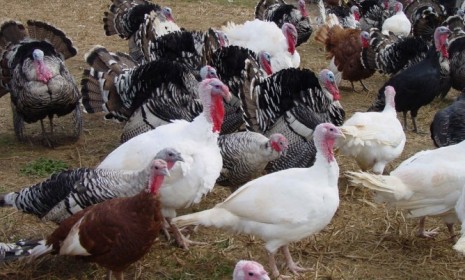The hidden cost of cheap turkeys
Birds from industrial farms appear to be less expensive than naturally raised birds, say Bill Niman and Nicolette Hahn Niman at The Atlantic. But look closer, and the math is not so clear

A free daily email with the biggest news stories of the day – and the best features from TheWeek.com
You are now subscribed
Your newsletter sign-up was successful
For the majority of Americans, the traditional Thanksgiving feast includes a very large, very cheap turkey, say Bill Niman and Nicolette Hahn Niman, ranchers who specialize in humane meats, at The Atlantic. Many supermarkets are offering "frozen commodity turkeys" raised on giant factory farms for as little as $1.50 a pound — a snip when compared to heritage birds costing around $7 a pound. Chefs insist the extra money buys you superior flavor, while "many consumers, especially if they haven't tasted a heritage turkey, wonder whether that splurge is really worth it." But when you calculate the hidden costs of mass-produced Broad-Breasted White turkeys, which are bred to have breasts so oversized they are "incapable of flight or natural mating," heritage birds don't seem so expensive. Here, an excerpt:
In many ways the commodity turkey is artificially cheap. In the immediate sense, industrial methods do lower production costs. These include intensive crowding in metal confinement buildings; minimal human care, made possible by total confinement and mechanized feed and water systems; and reliance on cheap feeds (often including slaughterhouse wastes and a panoply of pharmaceuticals). Government subsidies and lax enforcement of environmental laws also enable (and cheapen) industrial food production. The result of this system is water, air, and soil polluted by agricultural waste; meat with high levels of antibiotic-resistant bacteria; and animal suffering on an unprecedented scale. Although these costs don't show up on our grocery receipts, they are real and, ultimately, we all pay them.
Read the full article at The Atlantic.
The Week
Escape your echo chamber. Get the facts behind the news, plus analysis from multiple perspectives.

Sign up for The Week's Free Newsletters
From our morning news briefing to a weekly Good News Newsletter, get the best of The Week delivered directly to your inbox.
From our morning news briefing to a weekly Good News Newsletter, get the best of The Week delivered directly to your inbox.
A free daily email with the biggest news stories of the day – and the best features from TheWeek.com